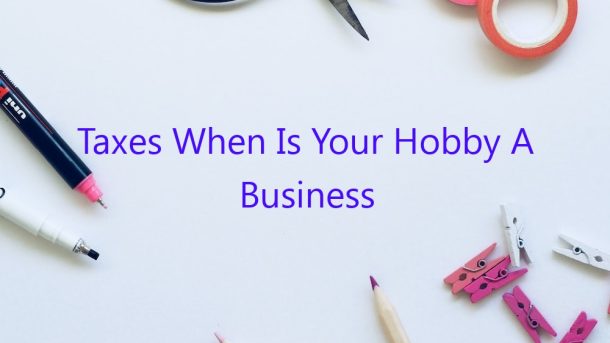There can be a lot of confusion when it comes to taxes and hobbies. Many people wonder if they need to report their hobby income to the IRS or if they can write off their hobby expenses. The answer to both of these questions is yes.
In general, if you are earning income from a hobby, you are required to report that income on your tax return. This applies no matter how small the amount of income may be. Likewise, you can write off any expenses related to your hobby, as long as they are considered to be necessary and reasonable.
There are a few things to keep in mind when it comes to taxes and hobbies. First, the IRS defines a hobby as an activity that is not engaged in for profit. This means that if you are trying to make a profit from your hobby, it is considered to be a business, and you should report the income and expenses accordingly.
Another thing to keep in mind is that you can only deduct expenses that are related to the hobby. For example, if you are a musician and you incur expenses related to your music career, such as the purchase of music equipment, you can deduct those expenses. However, if you incur expenses related to your personal life, such as the purchase of a new TV, you cannot deduct those expenses.
Finally, it is important to note that the IRS does not always consider a hobby to be taxable income. There are a few factors that the agency considers, such as the time and effort you put into the hobby, the amount of money you make from the hobby, and whether you are trying to make a profit.
If you are unsure whether your hobby qualifies as a business, it is always best to speak with a tax professional. They can help you determine whether you need to report your income and expenses, and they can also offer guidance on how to best structure your business.
Contents
At what point does the IRS consider a business a hobby?
The Internal Revenue Service (IRS) defines a business as an activity engaged in for profit. The key question the IRS asks is whether the activity is engaged in with the intent to make a profit. If the answer is no, the IRS will likely consider the activity a hobby and tax any income earned from it as such.
There are a few factors the IRS considers when making this determination, including whether the taxpayer is engaged in the activity full-time, the amount of time and effort put into the activity, the amount of loss or profit generated, and whether the activity is conducted in a business-like manner.
If you’re not sure whether your activity qualifies as a business, the IRS has a handy flowchart on its website to help you make the determination. If you do find that your activity is considered a hobby, there are a few things you can do to minimize the tax impact, including deducting any expenses related to the activity and reporting any income on Schedule C.
Do I need to report my hobby as a business?
Whether or not you need to report your hobby as a business depends on a few factors. Generally, if your hobby is making a profit and you’re not doing it as a hobby, you’re running a business. There are a few exceptions, however. If you’re just starting out and your hobby is making very little money, you may not need to report it. Additionally, if you’re not making a profit because you’re reinvesting all of your earnings back into your hobby, you may not need to report it. However, if you’re doing either of these things, it’s a good idea to talk to an accountant to make sure you’re in the clear.
Can I turn my hobby into a business for tax purposes?
You may be wondering if you can turn your hobby into a business for tax purposes. The answer is yes, you can, but there are a few things you need to know in order to make it happen.
First, you need to make sure that your hobby is actually classified as a business. To do this, you need to make a profit from it. If you’re just doing it for fun and don’t plan on making any money from it, then it’s not a business.
Secondly, you need to be aware of the different types of business structures. There are four main types: sole proprietorship, partnership, corporation, and limited liability company (LLC). You need to choose the right one for your business.
Third, you need to make sure you’re doing everything by the book. This means keeping track of your income and expenses and filing the necessary paperwork.
If you’re thinking of turning your hobby into a business, it’s a good idea to talk to an accountant or tax professional to make sure you’re doing everything correctly.
What qualifies as a hobby for tax purposes?
What qualifies as a hobby for tax purposes?
There is no specific definition of what constitutes a hobby for tax purposes, but the term is generally used to describe an activity that is pursued for pleasure rather than for financial gain. In order to claim a hobby as a tax deduction, you must be able to demonstrate that you are engaged in the activity for recreational purposes and that you are not engaged in it for profit.
There are a number of factors that the IRS will consider when determining whether an activity qualifies as a hobby for tax purposes. These factors include the amount of time and money you spend on the activity, the degree of enjoyment you derive from it, and whether you are able to make a profit from it. If you are able to show that you are engaged in the activity for recreational purposes and that you are not making a profit, you may be able to deduct certain expenses related to the activity.
The rules for claiming a hobby as a tax deduction are relatively complex, and you should speak to an accountant or tax specialist if you are considering doing so. However, if you are able to meet the requirements, claiming a hobby can be a great way to reduce your tax bill.
Can I earn money from a hobby without paying tax?
When it comes to earning money from a hobby, many people are unsure if they have to pay tax on the income. The good news is that, in most cases, you don’t have to pay tax on income from hobbies. However, there are a few things you need to keep in mind.
Firstly, the hobby has to be considered a hobby for tax purposes. This means that you can’t use it as a main source of income, and you can’t claim any deductions or expenses related to it. Secondly, you need to make sure you’re not earning more money from the hobby than you need to cover your expenses. If you are, you may need to pay tax on the excess income.
Finally, it’s important to remember that the rules around hobby income can vary depending on your country or state. So, if you’re not sure whether you have to pay tax on your hobby income, it’s best to speak to an accountant or tax specialist.
How much money do you have to make to be considered a business?
There is no one definitive answer to the question of how much money you have to make to be considered a business. The amount of money required to be considered a business depends on the type of business and the standards and regulations of the specific industry.
For example, a small business that is considered a sole proprietorship or a partnership may only require a small amount of money to start up, such as a few thousand dollars. However, a company that is registered as a C-Corp or an S-Corp may require a larger amount of money to start up, such as tens of thousands of dollars.
The amount of money a business needs to make to be considered a business also depends on the country or state in which the business is located. For example, in the United States, a business must make a certain amount of money in order to be considered a corporation. In order to be classified as a corporation, a business must have at least $2,500 in annual revenue.
The standards and regulations for businesses can vary greatly from country to country or state to state. It is important to research the specific requirements for your area in order to determine how much money you need to make to be considered a business.
What is hobby income limit?
What is hobby income limit?
The hobby income limit is the amount of money you can earn from a hobby without having to pay taxes on that income. The limit is based on how much money you earn from the hobby and how much time you spend on the hobby.
The IRS defines a hobby as an activity you do for recreation or pleasure, not for profit. You must report any income you earn from a hobby on your tax return. However, you can deduct any expenses related to the hobby that exceed the income.
The hobby income limit is $1,000 per year. This means you can earn up to $1,000 from your hobby without having to pay taxes on the income. If you earn more than $1,000 from your hobby, you must report the income and pay taxes on it.
The hobby income limit is based on the amount of time you spend on the hobby. If you spend more than 500 hours a year on the hobby, the income limit is $1,000. If you spend less than 500 hours a year on the hobby, the income limit is $2,500.
The hobby income limit applies to all types of income from the hobby, including income from selling products or services related to the hobby.
There are a few exceptions to the hobby income limit. If you are a professional artist, musician, or writer, you can report any income from your art or writing as taxable income. You can also report income from a hobby if you are involved in a business activity related to the hobby.
If you have any questions about the hobby income limit, please contact your tax advisor.




